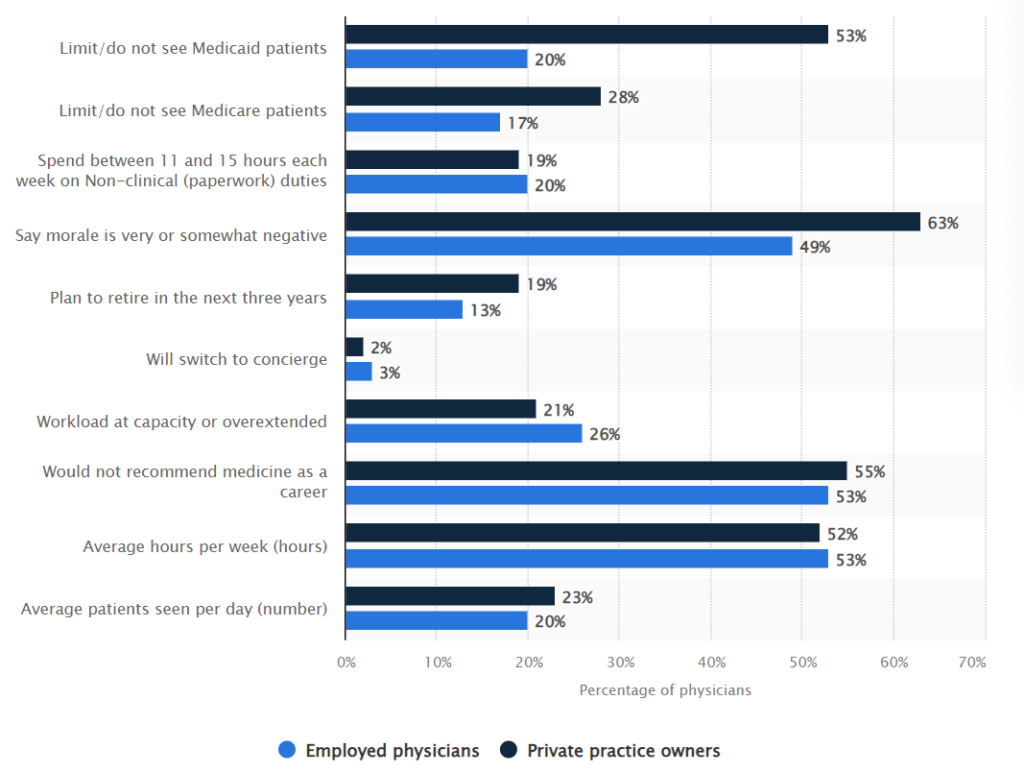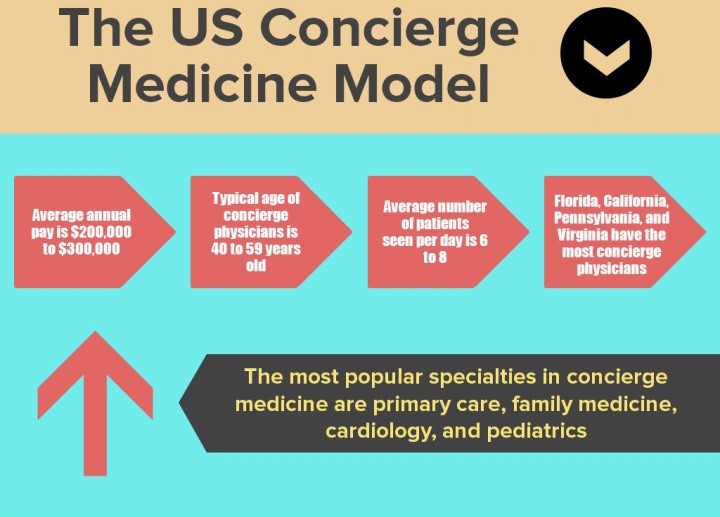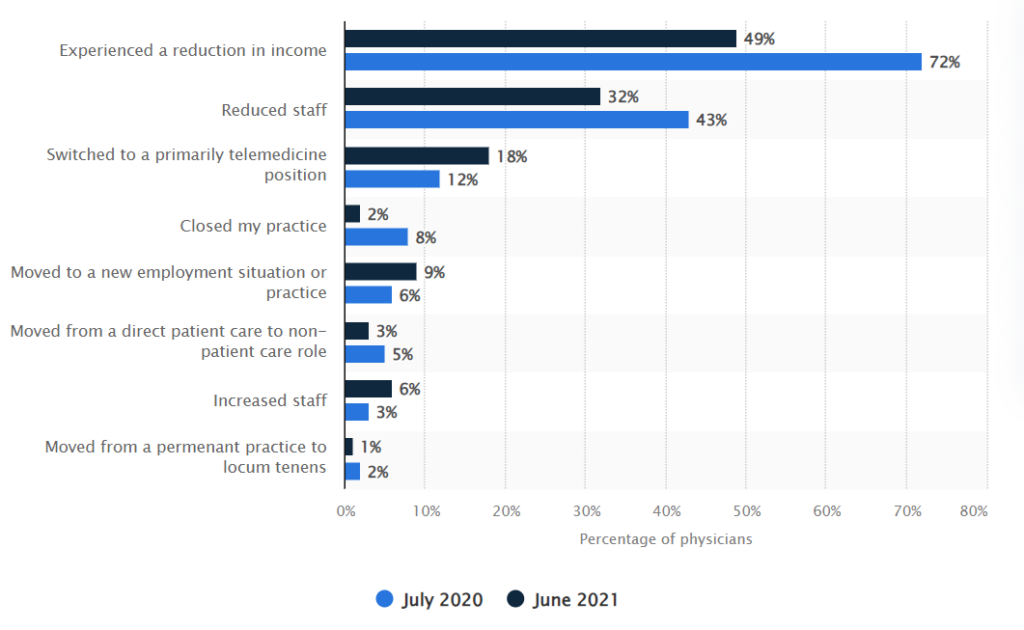Despite the U.S. spending more on healthcare than any other country, it often lags in health outcomes among high-income nations.
Facing high costs, long wait times, and impersonal care, patients often find themselves frustrated with the healthcare services they get.
Amid these challenges, concierge medicine has gained traction, offering a more personalized approach to healthcare. Its popularity has surged, especially in the aftermath of COVID, as patients and doctors seek more accessible, high-quality care.
So, why are doctors going to concierge medicine?
In this blog, we explore the motivations behind this shift, the benefits, and the potential challenges doctors might face. We’ll also provide insights into starting a concierge medical practice as a PCP doctor.
Why are Doctors Going to Concierge Medicine?
The U.S. healthcare system, despite its advanced technologies, is plagued with inefficiencies. This reality drives many physicians to seek alternatives like concierge medicine.
But why is concierge medicine becoming a popular option among doctors?
Medical professionals are increasingly attracted to the stability and control of the concierge model. Instead of juggling thousands of patients, they manage a smaller, more dedicated patient base, which allows for deeper, more meaningful relationships.
The financial predictability of concierge medicine is another major draw. Membership fees provide a steady income, freeing concierge doctors from the relentless cycle of insurance claims and reimbursements. This model not only reduces administrative burdens but also allows physicians to invest in state-of-the-art equipment and comprehensive wellness programs.
As Dr. Parks from WorldClinic explains,
“I realized our U.S. healthcare system is catastrophically failing the patient. WorldClinic’s concierge healthcare model afforded me the luxury to focus on the patient, their family, and their health needs without the constraints of insurance or corporate healthcare.”

Benefits of Concierge Medicine for Doctors
The shift to concierge medicine offers numerous benefits that make it an attractive alternative to traditional healthcare models. Here are some key advantages:
1. Building Meaningful Relationships
Imagine having the time to really get to know your patients—not just their medical histories, but their lives, their worries, and their goals. Concierge medicine allows you to do that.
With fewer patients, you can offer personalized care that truly makes a difference, leading to better health outcomes and more satisfied patients.
2. Quality Time with Patients
In a concierge practice, you can spend more time with each patient, conducting thorough examinations and having meaningful conversations about their health.
This shift from quantity to quality enables you to focus on preventive care and comprehensive wellness, which can be far more satisfying than the quick visits dictated by traditional healthcare systems.
3. Less Paperwork, More Patient Care
Tired of drowning in administrative tasks?
Concierge medicine cuts down on the paperwork and bureaucracy that bog down traditional practices. By simplifying billing and reducing reliance on insurance, you can spend more time doing what you love—caring for patients. This not only improves job satisfaction but also enhances the overall patient experience.
4. Stable Financial Model
Financial uncertainty can be a major stressor in traditional practices, with income fluctuating based on insurance reimbursements.
Concierge medicine offers a more stable financial model through membership fees. This allows you to plan and invest in your practice, ensuring you can provide the best possible care without worrying about the bottom line.
5. Greater Professional Freedom
Physicians are drawn to concierge medicine for numerous reasons, but the ability to practice medicine as they see fit tops the list. The concierge medicine model offers the freedom to make clinical decisions based on what’s best for patients rather than being dictated by insurance companies.
This control extends to how you manage your practice, from appointment scheduling to the range of services you offer. It’s a chance to practice medicine the way you’ve always envisioned.
6. Work-Life Balance Restored
Concierge medicine can help restore balance to your life. With a more manageable patient load and less administrative hassle, you can enjoy a healthier work-life balance.
Spend more time with your family, pursue your hobbies, and take care of your own health, all while delivering top-notch care to your patients.

Challenges of Switching to a Concierge Medicine Model
Transitioning from traditional primary care to a concierge medicine model presents several challenges for physicians:
Financial and Business Transition
Making the switch to concierge medicine often requires a significant financial investment. Whether you’re starting a new practice or converting an existing one, there are costs associated with:
- Setting up the concierge model
- Marketing your new services
- Losing income during the transition period
To minimize these additional costs, you need to ensure you have a solid business plan and financial cushion.
Re-Learning Medical Practice
Another key problem with concierge medicine is that adapting to this model means re-learning how to practice medicine.
Doctors used to high patient volumes and quick appointments might need time to adjust their approach to accommodate longer, more in-depth consultations.
Communicating the Switch to Patients
One of the most daunting tasks is informing existing patients about the switch to concierge medicine. This involves explaining the benefits, addressing misconceptions, and justifying the membership fees.
Not all patients will be able or willing to make the transition, which can lead to a reduction in patient numbers initially. To mitigate this challenge, aim for effective communication and education from the initial stages of the transition.
Potential Loss of Patients
Switching to a concierge model inevitably means reducing your patient panel from thousands to a few hundred. In fact, one study found that physicians who transitioned to a concierge model from a standard model retained only 12% of their patient base on average. While this allows for better care, it also means leaving some patients behind.
This can be challenging for physicians who have built long-term relationships with their patients. However, focusing on the benefits of providing more personalized care can help ease the transition and enhance the overall quality of care you deliver.
Misconceptions and Skepticism
There’s the popular misconception that concierge medicine is only for the wealthy, which can create skepticism and resistance in both doctors and patients.
That’s why it’s important to educate your community about the accessibility and value of concierge medicine for various patient demographics.
Increased Expectations
With concierge medicine, patients often have higher expectations for accessibility and personalized care. This can mean being available 24/7, making house calls, and providing extensive follow-up care. To avoid burnout, you should aim to balance these demands with your own work-life balance.
Regulatory and Legal Challenges
Physicians must ensure they comply with all relevant healthcare laws and regulations, which can vary by state.
This includes understanding the implications of concierge contracts, patient billing practices, and maintaining proper patient records. You can consult with legal and regulatory experts to avoid any potential pitfalls.

How to Start a Concierge Medical Practice as a PCP Doctor?
Switching to a concierge medicine model can seem daunting, but with careful planning and the right support, it can transform your practice and enhance patient care. Here are a few steps you can follow to make the transition smoothly and effectively:
- Evaluate your current practice: Assess patient demographics, services offered, and financial status to determine how a concierge model fits into your practice.
- Develop a business plan: Create a detailed business plan with financial projections, pricing, membership plans, and transition costs such as marketing and technology upgrades.
- Communicate with your patients: Inform patients about the transition, explaining the benefits and costs of the concierge model. Address their concerns and provide clear instructions on continuing care.
- Re-learn your practice style: Adapt your consultation style to focus on personalized and preventive care, making use of the additional time available for each patient.
- Implement new technology: Invest in advanced technology like electronic health records, telemedicine platforms, and patient management software to enhance care and streamline operations.
- Ensure legal and regulatory compliance: Understand the legal and regulatory requirements, including patient contracts and billing practices. Consult with a healthcare attorney to navigate complexities.
- Market your new practice: Promote your concierge practice through patient communications, social media, local advertising, and professional networks, where you can highlight the benefits of concierge medicine.
- Gradual transition: Consider offering concierge memberships alongside your existing practice. This hybrid model allows you to maintain your patient base while introducing new services.
- Partner with a concierge network: Partnering with established concierge medical providers like WorldClinic can ease your transition. WorldClinic helps PCP doctors gradually switch to the concierge model or adopt a hybrid approach. With extensive expertise, a vast referral network, and customizable membership plans, WorldClinic provides the infrastructure and support necessary for a smooth transition, allowing you to focus on patient care.
Conclusion
The shift towards concierge medicine is driven by the desire for better patient care, improved work-life balance, and financial stability. This model allows doctors to foster deeper relationships with patients and practice medicine in a way that aligns with their values and professional goals.
WorldClinic stands out as a viable concierge medical partner for physicians and health systems interested in making this transition. With customizable memberships, long-running expertise in concierge medicine, and a comprehensive support system, WorldClinic makes the switch smoother and more rewarding.
Ready to transform your practice? Contact us today to explore the benefits of partnering with a leader in concierge medicine.
Frequently Asked Questions
A concierge medical practice is a healthcare model where patients pay a membership fee for enhanced access to their physician.
This includes longer appointment times, same-day or next-day visits, 24/7 availability, and more personalized care. This allows doctors to focus on fewer patients, offering more comprehensive and tailored healthcare.
Yes, more primary care doctors are transitioning to concierge medicine. This shift is driven by the desire to spend more time with patients, reduce administrative burdens, and achieve a better work-life balance.
The rise in popularity of this model is also fueled by patients seeking more personalized and accessible healthcare.
When a doctor goes concierge, they shift from a traditional insurance-based practice to a membership-based model. This means they offer a range of personalized services to a smaller patient base in exchange for an annual or monthly fee.
Concierge doctors typically earn more than their counterparts in traditional practices.
While salaries can vary widely based on location, patient base, and specific services offered, concierge doctors often make between $150,000 and $300,000 annually. Some can earn significantly more, especially in high-demand areas or well-established practices.
Yes, doctors can switch specialties, although it requires additional training and certification. The process involves completing a residency program in the new specialty and passing the relevant board exams. This transition can be challenging but is achievable with dedication and proper planning.
The first step to becoming a concierge doctor involves evaluating the market and assessing the demand for concierge services in your area. Once you understand the market, the next step is to develop a business plan. This should outline the services you’ll offer, your pricing strategy, and the target patient demographics.
To run your business effectively, you may need to undergo additional training in business management or healthcare administration. Additionally, you should make sure to inform your current patients about the switch and educate them on the benefits of concierge services.
It can also be beneficial to partner with established concierge medical providers like WorldClinic to ease the transition. Lastly, consider customizing your services and tailor tailoring your membership plans to meet the specific needs of your patient base.


